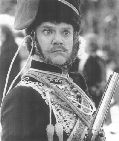
Flashman, by George MacDonald Fraser
pub 1969
Review by Tim
 One of my favorite historical periods is the 19th century British Empire. The color and adventure of that time is without doubt or equal, and is amply attested by the enormous number of novels and films set in that era. From the time Queen Victoria ascended the throne of England in 1837, to her death in 1901, the years of her reign were a pageant of scientific discovery, exploration, great literature, music and art around the world.
One of my favorite historical periods is the 19th century British Empire. The color and adventure of that time is without doubt or equal, and is amply attested by the enormous number of novels and films set in that era. From the time Queen Victoria ascended the throne of England in 1837, to her death in 1901, the years of her reign were a pageant of scientific discovery, exploration, great literature, music and art around the world.
The Victorian age also stood witness to the growth of the greatest and most curious empire the world had ever seen. Unlike the empires of Ghengis Khan and Alexander of Macedon, the British Empire was not the vision of a single conqueror, and grew almost without direction or conscious thought. For a large part of its history, British rule in India was not wielded at the direction of the British government, but by the board of directors of a private trading company, through its own armies and administrators.
Enter Sir Harry Paget Flashman: coward, cad, lecher and knave-of-all-trades, and the unlikely hero of a number of hilarious novels by George MacDonald Fraser. Fraser lifted the character from the pages of Tom Hughes' 19th century novel Tom Brown's Schooldays, using him to illustrate the world of the Victorian Age.
Flash Harry was an unwilling participant in almost every significant battle and drama of his times, from the disastrous retreat from Kabul (Afghanistan, 1842) to the defense of Rorke's Drift (Zululand, 1879). He was caught up in the Charge of the Light Brigade (Balaclava, 1855), survived Custer's Last Stand (Little Big Horn, 1876), cringed his way through the Great Mutiny (India, 1857), and was a prisoner of the empress-to-be Yehonala (Tzu-hsi) during the Taiping Rebellion (China, 1860).
Along the way, through circumstance and underhanded contrivance as chaotic as those attending the growth of the British Empire, Harry Flashman became the quintessential heroic Victorian Soldier, winning undeserved honors and decorations for valor, including the Victoria Cross and the US Congressional Medal of Honor. Flash Harry also won the admiration of a number of lovely (and often notorious) ladies captivated by his handsome soldier's figure and spurious reputation, a situation of which he took full and libidinous advantage.
Flashman is the first in a series of nine books (so far), and chronicles Sir Harry's life since leaving Rugby School through his thoroughly unwilling participation in the First Afghanistan War in 1842. It was during this war that a British force of 4,500 troops, accompanied by roughly 10,000 camp followers, began the long retreat from Kabul. Seven days later a lone horseman, Surgeon William Brydon, reached the walls of the British garrison at Jellalabad, some 60 miles east of Kabul, as the crow flies. The account of the retreat is one of suffering and heroism - though not by Flashman, who's cowardly and despicable conduct were not witnessed by any who survived, and who was mistaken as the heroic commander of the defense at Piper's Fort (Flash Harry spent most of his time cowering under his cot). He was lionized by his fellow officers, and dubbed "The Hector of Afghanistan" by his romantically inclined wife.
Fraser's novels of Harry Flashman are well researched and documented. While the actions and encounters of our "hero" are fictionalized, many of the characters and events are not. The tales are told in Flashman's own words which, while not unbiased in interpretation, are completely candid. Flashman, now an old man telling the story of his life, has resolved to hide nothing of his own true conduct and feelings, however damning. This allows Fraser to provide us a window on 19th century life and the growth of empire, albeit from the viewpoint of a scoundrel. If nothing else, the Flashman series provides an amusing and entertaining way of learning the history of many famous and curious persons and events of the Victorian Age.
 Malcolm McDowell as Harry Flashman
Malcolm McDowell as Harry Flashman
in the film version of George MacDonald
Fraser's novel Royal Flash.
Wikipedia article on Harry Paget Flashman

 One of my favorite historical periods is the 19th century British Empire. The color and adventure of that time is without doubt or equal, and is amply attested by the enormous number of novels and films set in that era. From the time Queen Victoria ascended the throne of England in 1837, to her death in 1901, the years of her reign were a pageant of scientific discovery, exploration, great literature, music and art around the world.
One of my favorite historical periods is the 19th century British Empire. The color and adventure of that time is without doubt or equal, and is amply attested by the enormous number of novels and films set in that era. From the time Queen Victoria ascended the throne of England in 1837, to her death in 1901, the years of her reign were a pageant of scientific discovery, exploration, great literature, music and art around the world. Malcolm McDowell as Harry Flashman
Malcolm McDowell as Harry Flashman